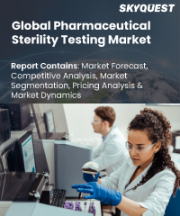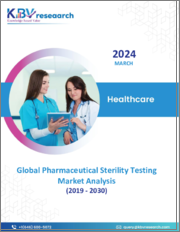
|
시장보고서
상품코드
1790199
미국의 의약품 무균 시험 시장 규모, 점유율, 동향 분석 보고서 : 유형별, 제품별, 시험별, 샘플별, 최종 용도별, 부문 예측(2025-2033년)U.S. Pharmaceutical Sterility Testing Market Size, Share & Trends Analysis Report By Type, By Product, By Test, By Sample, By End-use, And Segment Forecasts, 2025 - 2033 |
||||||
미국의 의약품 무균 시험 시장 개요
미국의 의약품 무균 시험 시장 규모는 2024년에 6억 7,000만 달러로 평가되었습니다. 2033년에는 17억 달러에 달하고, 2025-2033년 11.04%의 연평균 복합 성장률(CAGR)을 보일 것으로 예측됩니다. 시장을 주도하는 요인은 연구개발 활동의 활성화, 의약품 혁신의 발전, 품질 및 무균성에 대한 관심 증가, 헬스케어에 대한 정부 투자 증가 등입니다.
또한, 생물학적 제제 및 맞춤형 의약품에 대한 수요 증가, FDA 및 USP의 엄격한 규제 요건이 시장 성장을 가속할 것으로 예측됩니다. 또한, 신속한 미생물학적 방법(PCR, ATP 생물발광 등)의 채택, 오류를 최소화하기 위한 자동화의 발전, 데이터 분석 개선을 위한 AI 기반 분석의 활용 등이 아웃소싱과 효율적인 비용 관리의 확대 추세에 기여하고 있습니다. 특히 의약품 제조의 복잡성이 증가하고 환자 안전에 대한 관심이 높아짐에 따라, 시장은 제품의 안전과 컴플라이언스를 보장하는 보다 신속하고 신뢰할 수 있는 테스트 솔루션으로 전환하고 있습니다.
또한, 전 세계적으로 의약품 시판 수가 증가하고 있는 것도 의약품 무균 시험 산업의 큰 촉진요인으로 작용하고 있습니다. 미국 FDA에 따르면, 2024년에만 50개의 새로운 분자 생물학적 제제(NME)와 생물학적 제제가 의약품평가연구센터(CDER)의 승인을 받았으며, 개인 맞춤형 의료, 유전자 치료 및 새로운 생물학적 제제의 발전으로 인해 이러한 추세는 2025년에 가속화될 것으로 예측됩니다. 주사제, 백신, 첨단치료제(ATMP)를 포함하여 새로 출시되는 무균 의약품은 각각 FDA, EMA, WHO 등의 엄격한 규제 프레임워크를 준수하기 위해 엄격한 무균시험을 거쳐야 합니다.
약물 전달 시스템 및 생물학적 제제의 기술 혁신으로 무균 제제의 복잡성과 다양성이 증가함에 따라 무균 시험에 대한 수요는 더욱 증가하고 있습니다. 연구 조사에 따르면, 무균 주사제 파이프라인은 지속적인 R&D 투자와 미충족 의료 수요를 겨냥한 새로운 치료제 시장 진입을 반영하여 2024년 전년 대비 15% 이상 확대될 것으로 예상했습니다. 이러한 확장을 위해서는 무균 시험 능력의 강화, 신속한 미생물학적 방법의 채택, 안전성과 유효성을 보장하기 위한 시험 프로토콜의 조정이 필요합니다.
또한, 미국의 의약품 무균 시험 부문은 혁신적인 기술의 채택으로 빠르게 발전하고 있습니다. ATP 생물발광 및 PCR과 같은 새로운 신속 미생물학 기법은 오염 검출을 가속화하고 제품 출시 시간을 단축하고 있습니다. 자동화와 로봇공학의 활용 확대로 시험의 정확도가 향상되고 수작업으로 인한 실수가 줄어들고 있습니다. 또한, 인공지능이 데이터 분석을 지원하고 예측적 통찰력을 제공함으로써 의사결정 과정을 개선할 수 있습니다. 이러한 발전은 FDA 및 USP의 요구사항이 강화됨에 따라 복잡한 생물학적 제제 및 개인 맞춤형 치료의 안전 기준을 강화하는 데 도움이 될 것입니다.
목차
제1장 조사 방법과 범위
제2장 주요 요약
제3장 미국의 의약품 무균 시험 시장 변수, 동향, 범위
- 시장 계통 전망
- 상위 시장 전망
- 관련/보조 시장 전망
- 시장 역학
- 시장 성장 촉진요인 분석
- 시장 성장 억제요인 분석
- 가격 모델 분석
- 기술
- 시장 분석 툴
- Porter의 Five Forces 분석
- SWOT 분석에 의한 PESTEL
- COVID-19의 영향 분석
제4장 미국의 의약품 무균 시험 시장 : 유형별, 추정·동향 분석
- 미국의 의약품 무균 시험 시장(유형별) : 부문 대시보드
- 미국의 의약품 무균 시험 시장(유형별) : 변동 분석
- 유형별, 2021-2033년
- 사내
- 아웃소싱
제5장 미국의 의약품 무균 시험 시장 : 제품별, 추정·동향 분석
- 미국의 의약품 무균 시험 시장(제품별) : 부문 대시보드
- 미국 의약품 무균성 시험 시장(제품별) : 변동 분석
- 제품별, 2021-2033년
- 키트 및 시약
- 기기
- 서비스
제6장 미국의 의약품 무균 시험 시장 : 시험별, 추정·동향 분석
- 미국의 의약품 무균 시험 시장(시험 별) : 부문 대시보드
- 미국의 의약품 무균 시험 시장(시험 별) : 변동 분석
- 시험별, 2021-2033년
- 무균 시험
- 막여과
- 직접 접종
- 제품 플래시
- 바이오바덴 시험
- 세균 엔도톡신 시험
제7장 미국의 의약품 무균 시험 시장 : 최종 용도별, 추정·동향 분석
- 미국의 의약품 무균 시험 시장(최종 용도별) : 부문 대시보드
- 미국의 의약품 무균 시험 시장(최종 용도별) : 변동 분석
- 용도별, 2021-2033년
- 조제 약국
- 의료기기 기업
- 제약회사
- 기타
제8장 미국의 의약품 무균 시험 시장 : 샘플별, 추정·동향 분석
- 미국의 의약품 무균 시험 시장(샘플별) : 부문 대시보드
- 미국의 의약품 무균 시험 시장(샘플별) : 변동 분석
- 샘플별, 2021-2033년
- 의약품
- 의료기기
- 바이오의약품
제9장 경쟁 구도
- 시장 진출기업 분류
- 기업의 시장 점유율/평가 분석, 2024년
- 기업 개요
- Pacific Biolabs
- Steris Plc
- Boston Analytical
- Nelson Laboratories, LLC(Sotera Health)
- Sartorius AG
- SOLVIAS AG
- SGS SA
- Labcorp
- Pace Analytical
- Charles River Laboratories
- Thermo Fisher Scientific, Inc.
- Rapid Micro Biosystems
- Almac Group
제10장 주요 추천 사항
LSH 25.08.25U.S. Pharmaceutical Sterility Testing Market Summary
The U.S. pharmaceutical sterility testing market size was estimated at USD 0.67 billion in 2024 and is projected to reach USD 1.70 billion by 2033, growing at a CAGR of 11.04% from 2025 to 2033. The market is driven by increasing R&D activities, growing drug innovations, rising focus on quality & sterility, and rising government investments in healthcare.
Besides, rising demand for biologics, personalized medicines, and stringent regulatory requirements from the FDA and USP is expected to support the market growth. In addition, the adoption of rapid microbiological methods (such as PCR and ATP bioluminescence), increased automation to minimize errors, and the use of AI-driven analytics for improved data interpretation is contributing to growing trends toward outsourcing and managing costs effectively. Also, the market is shifting towards faster and more reliable testing solutions that ensure product safety and compliance, especially as the complexity of pharmaceutical manufacturing increases and there is an increased focus on patient safety.
Moreover, the rising number of drug launches globally continues to be a significant growth driver for the pharmaceutical sterility testing industry. According to the U.S. FDA, 50 new molecular entities (NMEs) and biologics were approved by Center for Drug Evaluation and Research (CDER) in 2024 alone, the trend is expected to accelerate in 2025 due to advancements in personalized medicine, gene therapies, and novel biologics. Each newly launched sterile drug, including injectables, vaccines, and advanced therapy medicinal products (ATMPs), requires stringent sterility testing to comply with rigorous regulatory frameworks such as those from the FDA, EMA, and WHO.
The growing complexity and diversity of sterile formulations, driven by innovations in drug delivery systems and biologics, further intensify sterility testing demands. As per the research study, the pipeline of sterile injectable drugs expanded by over 15% year-on-year in 2024, reflecting sustained R&D investment and market entry of novel therapies targeting unmet medical needs. This expansion requires enhanced sterility testing capacity, adoption of rapid microbiological methods, and tailored testing protocols to ensure safety and efficacy.
Furthermore, the U.S. pharmaceutical sterility testing sector is evolving rapidly due to the adoption of innovative technologies. Emerging rapid microbiological methods, such as ATP bioluminescence and PCR, are accelerating contamination detection and shortening product release times. The increased use of automation and robotics enhances testing accuracy while reducing manual errors. In addition, artificial intelligence aids in data analysis and provides predictive insights, improving decision-making processes. These advancements align with stricter FDA and USP requirements, ensuring enhanced safety standards for complex biologics and personalized therapies.
U.S. Pharmaceutical Sterility Testing Market Report Segmentation
This report forecasts revenue growth at country level and provides an analysis of the latest industry trends in each of the sub-segments from 2021 to 2033. For this study, Grand View Research has segmented the U.S. pharmaceutical sterility testing market report based on type, product, test, sample, and end-use.
- Type Outlook (Revenue, USD Million, 2021 - 2033)
- In-House
- Outsourcing
- Product Outlook (Revenue, USD Million, 2021 - 2033)
- Kits and Reagents
- Instruments
- Services
- Test Outlook (Revenue, USD Million, 2021 - 2033)
- Sterility Testing
- Membrane Filtration
- Direct Inoculation
- Product Flush
- Bioburden Testing
- Bacterial Endotoxin Testing
- Sample Outlook (Revenue, USD Million, 2021 - 2033)
- Pharmaceuticals
- Medical Devices
- Biopharmaceuticals
- End-use Outlook (Revenue, USD Million, 2021 - 2033)
- Compounding Pharmacies
- Medical Device Companies
- Pharmaceutical Companies
- Others
Table of Contents
Chapter 1. Research Methodology and Scope
- 1.1. Market Segmentation & Scope
- 1.2. Market Definitions
- 1.3. Research Methodology
- 1.4. Information Procurement
- 1.4.1. Purchased Database
- 1.4.2. GVR's Internal Database
- 1.4.3. Secondary Sources
- 1.4.4. Primary Research
- 1.5. Information Or Data Analysis
- 1.5.1. Data Analysis Models
- 1.6. Market Formulation & Validation
- 1.7. Model Details
- 1.7.1. Commodity flow analysis (Model 1)
- 1.7.2. Value chain based analysis (Model 2)
- 1.7.3. Multivariate Analysis (Model 3)
- 1.8. List Of Secondary Sources
- 1.9. List Of Abbreviations
- 1.10. Objectives
Chapter 2. Executive Summary
- 2.1. Market Outlook
- 2.2. Segment Outlook
- 2.3. Competitive Insights
Chapter 3. U.S. Pharmaceutical Sterility Testing Market Variables, Trends & Scope
- 3.1. Market Lineage Outlook
- 3.1.1. Parent Market Outlook
- 3.1.2. Related/Ancillary Market Outlook
- 3.2. Market Dynamics
- 3.2.1. Market Driver Analysis
- 3.2.1.1. Supportive Government Investment in Healthcare Industry
- 3.2.1.2. Increasing R&D Activities
- 3.2.1.3. Increasing Number of Drug Launches
- 3.2.1.4. Increasing Focus on Quality and Sterility
- 3.2.2. Market Restraint Analysis
- 3.2.2.1. Compliance Issues While Outsourcing
- 3.2.2.2. Third Party Performance
- 3.2.1. Market Driver Analysis
- 3.3. Pricing Model Analysis
- 3.4. Technology Landscape
- 3.5. Market Analysis Tools
- 3.5.1. Porter's Five Force Analysis
- 3.5.2. PESTEL by SWOT Analysis
- 3.5.3. COVID-19 Impact Analysis
Chapter 4. U.S. Pharmaceutical Sterility Testing Market: Type Estimates & Trend Analysis
- 4.1. U.S. Pharmaceutical Sterility Testing Market, By Type: Segment Dashboard
- 4.2. U.S. Pharmaceutical Sterility Testing Market, By Type: Movement Analysis
- 4.3. U.S. Pharmaceutical Sterility Testing Market Estimates & Forecasts, By Type, 2021-2033 (USD Million)
- 4.4. In-House
- 4.4.1. In-House Market Estimates and Forecasts, 2021 - 2033 (USD Million)
- 4.5. Outsourcing
- 4.5.1. Outsourcing Market Estimates and Forecasts, 2021 - 2033 (USD Million)
Chapter 5. U.S. Pharmaceutical Sterility Testing Market: Product Estimates & Trend Analysis
- 5.1. U.S. Pharmaceutical Sterility Testing Market, By Product: Segment Dashboard
- 5.2. U.S. Pharmaceutical Sterility Testing Market, By Product: Movement Analysis
- 5.3. U.S. Pharmaceutical Sterility Testing Market Estimates & Forecasts, By Product, 2021-2033 (USD Million)
- 5.4. Kits and Reagents
- 5.4.1. Kits and Reagents Market Estimates and Forecasts, 2021 - 2033 (USD Million)
- 5.5. Instruments
- 5.5.1. Instruments Market Estimates and Forecasts, 2021 - 2033 (USD Million)
- 5.6. Services
- 5.6.1. Services Market Estimates and Forecasts, 2021 - 2033 (USD Million)
Chapter 6. U.S. Pharmaceutical Sterility Testing Market: Test Estimates & Trend Analysis
- 6.1. U.S. Pharmaceutical Sterility Testing Market, By Test: Segment Dashboard
- 6.2. U.S. Pharmaceutical Sterility Testing Market, By Test: Movement Analysis
- 6.3. U.S. Pharmaceutical Sterility Testing Market Estimates & Forecasts, By Test, 2021-2033 (USD Million)
- 6.4. Sterility Testing
- 6.4.1. Sterility Testing Market Estimates and Forecasts, 2021 - 2033 (USD Million)
- 6.4.2. Membrane Filtration
- 6.4.2.1. Membrane Filtration Market Estimates and Forecasts, 2021 - 2033 (USD Million)
- 6.4.3. Direct Inoculation
- 6.4.3.1. Direct Inoculation Market Estimates and Forecasts, 2021 - 2033 (USD Million)
- 6.4.4. Product Flush
- 6.4.4.1. Product Flush Market Estimates and Forecasts, 2021 - 2033 (USD Million)
- 6.5. Bioburden Testing
- 6.5.1. Bioburden Testing Market Estimates and Forecasts, 2021 - 2033 (USD Million)
- 6.6. Bacterial Endotoxin Testing
- 6.6.1. Bacterial Endotoxin Testing Market Estimates and Forecasts, 2021 - 2033 (USD Million)
Chapter 7. U.S. Pharmaceutical Sterility Testing Market: End-Use Estimates & Trend Analysis
- 7.1. U.S. Pharmaceutical Sterility Testing Market, By End-Use: Segment Dashboard
- 7.2. U.S. Pharmaceutical Sterility Testing Market, By End-Use: Movement Analysis
- 7.3. U.S. Pharmaceutical Sterility Testing Market Estimates & Forecasts, By End-Use, 2021-2033 (USD Million)
- 7.4. Compounding Pharmacies
- 7.4.1. Compounding Pharmacies Market Estimates and Forecasts, 2021 - 2033 (USD Million)
- 7.5. Medical Device Companies
- 7.5.1. Medical Device Companies Market Estimates and Forecasts, 2021 - 2033 (USD Million)
- 7.6. Pharmaceutical Companies
- 7.6.1. Pharmaceutical Companies Market Estimates and Forecasts, 2021 - 2033 (USD Million)
- 7.7. Others
- 7.7.1. Others Market Estimates and Forecasts, 2021 - 2033 (USD Million)
Chapter 8. U.S. Pharmaceutical Sterility Testing Market: Sample Estimates & Trend Analysis
- 8.1. U.S. Pharmaceutical Sterility Testing Market, By Sample: Segment Dashboard
- 8.2. U.S. Pharmaceutical Sterility Testing Market, By Sample: Movement Analysis
- 8.3. U.S. Pharmaceutical Sterility Testing Market Estimates & Forecasts, By Sample, 2021-2033 (USD Million)
- 8.4. Pharmaceuticals
- 8.4.1. Pharmaceuticals Market Estimates and Forecasts, 2021 - 2033 (USD Million)
- 8.5. Medical Devices
- 8.5.1. Medical Devices Market Estimates and Forecasts, 2021 - 2033 (USD Million)
- 8.6. Biopharmaceuticals
- 8.6.1. Biopharmaceuticals Market Estimates and Forecasts, 2021 - 2033 (USD Million)
Chapter 9. Competitive Landscape
- 9.1. Market Participant Categorization
- 9.2. Company Market Share/Assessment Analysis, 2024
- 9.3. Company Profiles
- 9.3.1. Pacific Biolabs
- 9.3.1.1. Company overview
- 9.3.1.2. Financial performance
- 9.3.1.3. Service benchmarking
- 9.3.1.4. Strategic initiatives
- 9.3.2. Steris Plc
- 9.3.2.1. Company overview
- 9.3.2.2. Financial performance
- 9.3.2.3. Service benchmarking
- 9.3.2.4. Strategic initiatives
- 9.3.3. Boston Analytical
- 9.3.3.1. Company overview
- 9.3.3.2. Financial performance
- 9.3.3.3. Service benchmarking
- 9.3.3.4. Strategic initiatives
- 9.3.4. Nelson Laboratories, LLC (Sotera Health)
- 9.3.4.1. Company overview
- 9.3.4.2. Financial performance
- 9.3.4.3. Service benchmarking
- 9.3.4.4. Strategic initiatives
- 9.3.5. Sartorius AG
- 9.3.5.1. Company overview
- 9.3.5.2. Financial performance
- 9.3.5.3. Service benchmarking
- 9.3.5.4. Strategic initiatives
- 9.3.6. SOLVIAS AG
- 9.3.6.1. Company overview
- 9.3.6.2. Financial performance
- 9.3.6.3. Service benchmarking
- 9.3.6.4. Strategic initiatives
- 9.3.7. SGS SA
- 9.3.7.1. Company overview
- 9.3.7.2. Financial performance
- 9.3.7.3. Service benchmarking
- 9.3.7.4. Strategic initiatives
- 9.3.8. Labcorp
- 9.3.8.1. Company overview
- 9.3.8.2. Financial performance
- 9.3.8.3. Service benchmarking
- 9.3.8.4. Strategic initiatives
- 9.3.9. Pace Analytical
- 9.3.9.1. Company overview
- 9.3.9.2. Financial performance
- 9.3.9.3. Service benchmarking
- 9.3.9.4. Strategic initiatives
- 9.3.10. Charles River Laboratories
- 9.3.10.1. Company overview
- 9.3.10.2. Financial performance
- 9.3.10.3. Service benchmarking
- 9.3.10.4. Strategic initiatives
- 9.3.11. Thermo Fisher Scientific, Inc.
- 9.3.11.1. Company overview
- 9.3.11.2. Financial performance
- 9.3.11.3. Service benchmarking
- 9.3.11.4. Strategic initiatives
- 9.3.12. Rapid Micro Biosystems
- 9.3.12.1. Company overview
- 9.3.12.2. Financial performance
- 9.3.12.3. Service benchmarking
- 9.3.12.4. Strategic initiatives
- 9.3.13. Almac Group
- 9.3.13.1. Company overview
- 9.3.13.2. Financial performance
- 9.3.13.3. Service benchmarking
- 9.3.13.4. Strategic initiatives
- 9.3.1. Pacific Biolabs
Chapter 10 Key Recommendations
(주말 및 공휴일 제외)

















